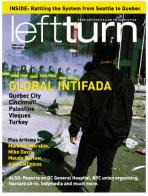Subscribe to Our Newsletter
Special Offer from PM Press
Now more than ever there is a vital need for radical ideas. In the four years since its founding - and on a mere shoestring - PM Press has risen to the formidable challenge of publishing and distributing knowledge and entertainment for the struggles ahead. With over 200 releases to date, they have published an impressive and stimulating array of literature, art, music, politics, and culture.
PM Press is offering readers of Left Turn a 10% discount on every purchase. In addition, they'll donate 10% of each purchase back to Left Turn to support the crucial voices of independent journalism. Simply enter the coupon code: Left Turn when shopping online or mention it when ordering by phone or email.
Click here for their online catalog.
Capitalism: How profit rules
 Lockeed Martin, the biggest arms manufacturer in the world. GlaxoSmithKline, the most profitable drug company. Exxon, the leading oil giant. These multinationals are the modern day horsemen of the apocalypse—merchants of death, profiteers from disease, polluters on a global scale.
Lockeed Martin, the biggest arms manufacturer in the world. GlaxoSmithKline, the most profitable drug company. Exxon, the leading oil giant. These multinationals are the modern day horsemen of the apocalypse—merchants of death, profiteers from disease, polluters on a global scale.
They and the 200 or so other giant corporations are the pride of the capitalist system. And they express all that is wrong with it. Capitalism is not as simple as a greedy state of mind. It is a particular way of organizing society that developed in northern Europe two centuries ago and now dominates the world. Every society needs to produce the wherewithal for people to live and sustain the next generation. Capitalism separates the people involved in that production process from the technologies, offices, factories and other “means of production” that are needed for it to take place.
It creates a majority class, the working class, who collectively do the work, and a minority, the capitalists, who own or control the means of production. That happened at the birth of capitalism. The early British capitalists forced peasants off the land into cities where they had no way of surviving other than selling their ability to work to someone else. Today laws and repressive institutions like the police defend the capitalists’ monopoly of the means of production.
It is perfectly legal to shut a factory, but illegal for workers to occupy one. Capitalists even slap patents on scientific techniques and ideas. They are like kidnappers, seizing what society needs and allowing it to be used only if they can make a profit from it. That profit comes from exploitation, paying workers for just a fraction of the work they are forced to do. The capitalists as a whole exploit workers. They are also in cut-throat competition with one another.
Law of the jungle
There is no overall plan of production. So in the car industry, for example, companies such as GM, Ford and Nissan each try to grab a larger share of the market at the expense of the others. Competition means capitalists cannot sit back at the end of the year after making a profit. They must reinvest again and again in new plants and expanded production in order not to fall behind.
This pressure to “accumulate capital,” as Karl Marx put it, is relentless. He described in the Communist Manifesto in 1848 how “the need of a constantly expanding market for its products chases the bourgeoisie over the whole surface of the globe. It must nestle everywhere, settle everywhere, establish connections everywhere.”
He saw how capitalism ripped up other forms of production, such as peasant agriculture. Capitalism has created huge concentrations of new technologies and means of production through re-investing the profits it gets from exploiting more and more workers. But that has come at a terrible price.
More areas of our lives are subordinated to this drive for profit and accumulation than ever before. That’s why we see multinationals invading education, health and other services. Choices in our personal lives are corrupted by the multibillion dollar advertising industry. And increasing exploitation means workers everywhere face longer hours, and attacks on pay and conditions.
To the brink
So new “labor-saving machines” mean workers get sacked, and those who remain must work harder. At its most obscene, capitalism brings an undreamt of capacity to feed the world alongside famine.
Companies pump out goods in competition with one another, rather than in a planned way to meet people’s needs. The result, most obviously in the cellular phone industry today, is more goods produced than can be bought. They go unsold because people cannot afford them. The economy lurches from boom to slump.
The whole world becomes a prisoner of capitalism’s crazy logic. Capitalists employ scientists who warn them about global warming. But none of them can pull back from the precipice for fear of handing an advantage to competitors using polluting techniques. Two centuries of accumulation and competition have produced today’s multinational juggernauts.
Alongside them stand powerful states, which extend capitalist competition to the arms race and wars as they try to secure areas of the world for their firms. The multinationals, states and institutions such as the IMF, World Bank and WTO are all aspects of capitalism. In opposing them, we need to link each particular struggle into a powerful movement, based on the exploited mass of the world’s population, against a system which was created by human beings but which now threatens to destroy them.

